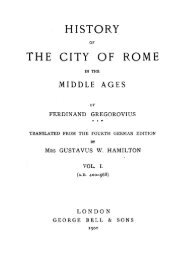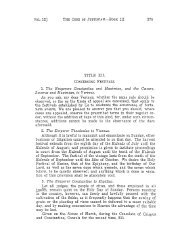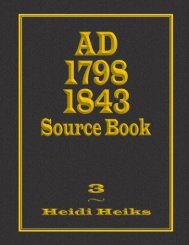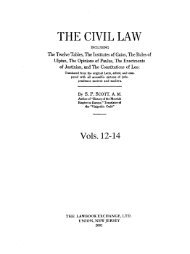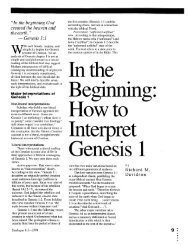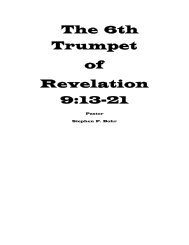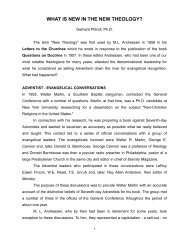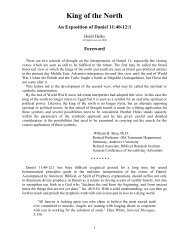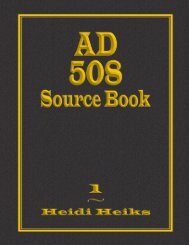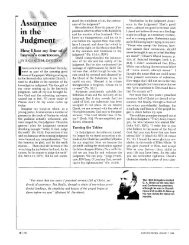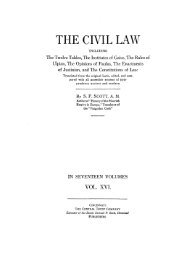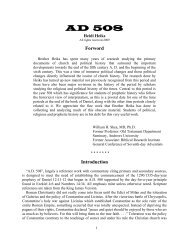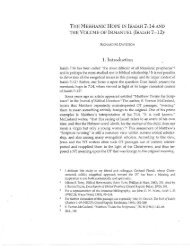Create successful ePaper yourself
Turn your PDF publications into a flip-book with our unique Google optimized e-Paper software.
<strong>Judgment</strong> <strong>in</strong> <strong>Daniel</strong> 7This relationship emphasizes the thematic connections between thecontent of these two stanzas. The Ancient of days comes upon the scene<strong>in</strong> the first, and the judgment beg<strong>in</strong>s. In the second stanza the Son ofmancomes upon the scene at the end of that judgment, and it is as a result ofthatjudgment that the k<strong>in</strong>gdom is conferred upon him. In brief, therefore,these two stanzas provide us with two pictures of the judgment: its beg<strong>in</strong>n<strong>in</strong>gand its end. Their separation <strong>in</strong>to two poetic stanzas, between whicha piece ofprose <strong>in</strong>telVenes, suggests thatsome time was to elapse betweenthe realization ofthese two events. Thecourseofthejudgment<strong>in</strong> betweenthem is not described.The second verb ("shall worship") <strong>in</strong> the bicolon, which refers to thek<strong>in</strong>gdom be<strong>in</strong>g given to the Son ofman (vs. 14a), is particularly importantto note. Its root, pela/1, identifies the action <strong>in</strong> which all of the nations,peoples, and tongues will participate as worship. The Son of man is thusto be worshiped by every human be<strong>in</strong>g who will populate his new worldwideand eternal k<strong>in</strong>gdom. This is another <strong>in</strong>dication ofthe div<strong>in</strong>e characterof the Son of man, s<strong>in</strong>ce only a div<strong>in</strong>e supra-angelical personage likethe Ancient of days is worthy of such worship. The extent and nature ofthe k<strong>in</strong>gdom to be given Him also suggests that the Son of man is div<strong>in</strong>e<strong>in</strong> character.Theword used for "dom<strong>in</strong>ion" (saltan) is related to our loanword "sultan."No future person or power such as those represented by the preced<strong>in</strong>gbeasts and horns are to receive or to take this dom<strong>in</strong>ion from Him. Incontrast to the k<strong>in</strong>gdoms represented by thebeasts and horns, the k<strong>in</strong>gdomof the Son of man will never be destroyed. The shift <strong>in</strong> the tense of theverbs employed <strong>in</strong> the stanza emphasizes this po<strong>in</strong>t.Verbs <strong>in</strong> the form ofthe Hebrew perfect occur throughout the stanzauntil its last three l<strong>in</strong>es or colons. These verbs may be described as "propheticperfects," as are also the verbs <strong>in</strong> the first and last bicola of thepreced<strong>in</strong>g stanza (vss. 9-10). (The "prophetic perfect" is an expressionused to designate a phenomenon <strong>in</strong> the Hebrewlanguage <strong>in</strong> which afutureevent is stated <strong>in</strong> the perfect form oftheverb as though it had already happened.)This usage of the perfect is common to OT prophecy.With the last l<strong>in</strong>es ofthis stanza, however, there is a shift to imperfects("shall worship," "shall not pass away," "shall not be destroyed"). Theseverbal expressions do not emphasize so much the future occurrenceofthisk<strong>in</strong>gdom as they do its ongo<strong>in</strong>g and endur<strong>in</strong>g nature. The last two verbsthat express this idea ("shall not pass away, shall not be destroyed") arepaired together at the end of the last bicolon ofthe stanza. The second of126



